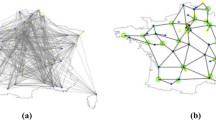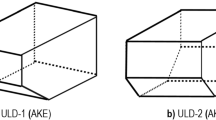Abstract
The transportation industry is a vital component of the global economy, responsible for the movement of goods between different locations. The intermodal freight transportation system involves the use of different modes of transportation, such as trucks, trains, and ships, to move freight containers. However, this system is loaded with inefficiencies due to the poor availability of real-time coordination and disruptions, causing delays, increased costs, and thus, higher carbon emissions. AI has the potential to improve the intermodal freight transportation system’s efficiency by optimizing operations in real-time and self-evolving the models to make better/faster decisions. While both policymaking and business operations would benefit from using real-time optimization models, the implications and applications of these models are different in each context. In policymaking, real-time optimization models are used to improve public services, reduce overall network costs, and setting regulations for sustainable management of the network. The system can consider real-time traffic conditions, weather, and other factors to optimize the routing of the trucks, reducing transportation costs, improving delivery times, maintaining resiliency, and managing emissions. This work aims to contribute with a better understanding on how these information systems can be protected from cyberthreats, while performing the optimization of freight synchromodal transportation operations in real-time in terms of efficiency, cost-effectiveness, and carbon emissions reduction, considering the dynamic nature and heterogeneity of the intermodal freight system.
Access this chapter
Tax calculation will be finalised at checkout
Purchases are for personal use only
Similar content being viewed by others
References
Cost of a Data Breach Report 2022. IBM (2022). https://www.ibm.com/reports/data-breach?utm_medium=OSocial&utm_source=Blog&utm_content=SSSWW&utm_id=Security-Intelligence-Blog-Banners%20&_ga=2.169531361.1119445732.1681783239-1093745095.1681783239. Accessed 14 Apr 2023
What is DevSecOps? IBM (2023). https://www.ibm.com/topics/devsecops#Benefits%20of%20DevSecOps. Accessed 17 Apr 2023
Zero Trust Architecture. GAO (2022). https://www.gao.gov/products/gao-23-106065. Accessed 15 Apr 2023
Protecting data at rest. AWS Inc. (2023). https://docs.aws.amazon.com/wellarchitected/latest/security-pillar/protecting-data-at-rest.html. Accessed 17 Apr 2023
US Department of Commerce, National Oceanic and Atmospheric Administration: API web service (2023). https://www.weather.gov/documentation/services-web-api. Accessed 10 Apr 2023
NIST. Post-quantum cryptography: CSRC (2017). https://csrc.nist.gov/projects/post-quantum-cryptography. Accessed 18 Apr 2023
NIST. Round 3 submissions - post-quantum cryptography: Computer Security Resource Center (CSRC) (2023). https://csrc.nist.gov/Projects/post-quantum-cryptography/post-quantum-cryptography-standardization/round-3-submissions. Accessed 17 Apr 2023
NVIDIA. NVIDIA H100 Tensor Core GPU Datasheet. NVIDIA (2022). https://resources.nvidia.com/en-us-tensor-core/nvidia-tensor-core-gpu-datasheet. Accessed 13 Apr 2023
NVIDIA. Triton Inference Server. NVIDIA Developer (2023). https://developer.nvidia.com/nvidia-triton-inference-server#ecosystem. Accessed 14 Apr 2023
NVIDIA. Nvidia TENSORRT. NVIDIA Developer (2023). https://developer.nvidia.com/tensorrt. Accessed 14 Apr 2023
JSON and XML weather API and Geolocation Developer API. Free Weather API - WeatherAPI.com (n.d.). https://www.weatherapi.com/. Accessed 10 Apr 2023
Abril, D., Velasquez-Bermudez, J., Paternina-Arboleda, C.D., Cantillo, V.: Integrated tactical-operational event-driven real-time optimization framework for smart ports operations planning. Marit. Econ. Logist. (2023, Submitted)
Aggarwal, B.K., Gupta, A., Goyal, D., Gupta, P., Bansal, B., Barak, D.D.: A review on investigating the role of block-chain in cyber security. Mater. Today Proc. 56(Part 6), 3312–3316 (2022). ISSN: 2214-7853. https://doi.org/10.1016/j.matpr.2021.10.124
Aggarwal, A., Dhurkari, R.K.: Association between stress and information security policy non-compliance behavior: a meta-analysis. Comput. Secur. 124, 102991 (2023). ISSN: 0167-4048. https://doi.org/10.1016/j.cose.2022.102991
Amador-Fontalvo, J.A., Paternina-Arboleda, C.D., Montoya-Torres, J.R.: Solving the heterogeneous vehicle routing problem with time windows and multiple products via a bacterial meta-heuristic. Int. J. Adv. Oper. Manag. 6(1), 81–100 (2014)
Auld, J., Hope, M., Ley, H., Sokolov, V., Xu, B., Zhang, K.: POLARIS: agent-based modeling framework development and implementation for integrated travel demand and network and operations simulations. Transp. Res. Part C Emerg. Technol. 64, 101–116 (2016)
Beaumont, P.: Cybersecurity risks and automated maritime container terminals in the age of 4IR. In: Information and Cybersecurity in the Fourth Industrial Revolution. IGI Global (2018). https://doi.org/10.4018/978-1-5225-4763-1.ch017
Cammin, P., Yu, J., Voß, S.: Tiered prediction models for port vessel emissions inventories. Flex Serv. Manuf. J. 35, 142–169 (2023). https://doi.org/10.1007/s10696-022-09468-5
Cobb, M.: What is the RSA algorithm? Definition from search security. Security (2021). https://www.techtarget.com/searchsecurity/definition/RSA. Accessed 17 Apr 2023
De la Cruz, J.J., Paternina-Arboleda, C.D., Cantillo, V., Montoya-Torres, J.R.: A two-pheromone trail ant colony system—tabu search approach for the heterogeneous vehicle routing problem with time windows and multiple products. J. Heuristics 19, 233–252 (2013). https://doi.org/10.1007/s10732-011-9184-0
De la Peña-Zarzuelo, I., Soeane, M.J.F., Bermúdez, B.L.: Industry 4.0 in the port and maritime industry: a literature review. J. Ind. Inf. Integr. 20, 100173 (2020). ISSN: 2452-414X. https://doi.org/10.1016/j.jii.2020.100173
Dzemydienė, D., Burinskienė, A., Čižiūnienė, K., Miliauskas, A.: Development of E-service provision system architecture based on IoT and WSNs for monitoring and management of freight intermodal transportation. Sensors 23(5), 2831 (2023). https://doi.org/10.3390/s23052831
Froehlich, A.: SOAR vs. SIEM: What’s the difference? Tech Target (2023). https://www.techtarget.com/searchsecurity/answer/SOAR-vs-SIEM-Whats-the-difference. Accessed 15 Apr 2023
Gillis, A.: Thin client (lean client). Tech Target (2021). https://www.techtarget.com/searchnetworking/definition/thin-client. Accessed 16 Apr 2023
Guo, X., He, J., Lan, M., Yu, H., Yan, W.: Modeling carbon emission estimation for hinterland-based container intermodal network. J. Clean. Prod. 378, 134593 (2022). ISSN: 0959-6526. https://doi.org/10.1016/j.jclepro.2022.134593
Jubiz-Diaz, M.A., Saltarin-Molino, M.A., Arellana, J., Paternina-Arboleda, C.D., Yie-Pinedo, R.: Effect of infrastructure investment and freight accessibility on gross domestic product: a data-driven geographical approach. J. Adv. Transp. 2021 (2021). Article ID: 5530114. https://doi.org/10.1155/2021/5530114
Lipner, S.B., et al.: Security kernels. In: Proceedings of the May 6–10, 1974, National Computer Conference and Exposition on - AFIPS 1974, vol. 43, pp. 977–978 (1974). https://doi.org/10.1145/1500175.1500361
Loshin, P.: IPsec vs. SSL VPN: comparing speed, security risks and technology. Tech Target (2019). https://www.techtarget.com/searchsecurity/tip/IPSec-VPN-vs-SSL-VPN-Comparing-respective-VPN-security-risks
Moros-Daza, A., Solano, N.C., Amaya, R., Paternina, C.: A multivariate analysis for the creation of Port Community System approaches. Transp. Res. Procedia 30, 127–136 (2018). ISSN: 2352-1465. https://doi.org/10.1016/j.trpro.2018.09.015
Moros-Daza, A., Hoz, D.-D., Jaller-Martelo, M., Paternina-Arboleda, C.D.: Using advanced information systems to improve freight efficiency: results from a pilot program in Colombia. In: Paternina-Arboleda, C., Voß, S. (eds.) ICCL 2019. LNCS, vol. 11756, pp. 22–38. Springer, Cham (2019). https://doi.org/10.1007/978-3-030-31140-7_2
Moros-Daza, A., Amaya-Mier, R., Paternina-Arboleda, C.: Port Community Systems: a structured literature review. Transp. Res. Part A Policy Pract. 133, 27–46 (2020). ISSN: 0965-8564. https://doi.org/10.1016/j.tra.2019.12.021
Möller, M., Vuik, C.: On the impact of quantum computing technology on future developments in high-performance scientific computing. Ethics Inf. Technol. 19(4), 253–269 (2017). https://doi.org/10.1007/s10676-017-9438-0
Nichols, B.: The Current State of DevSecOps Metrics. CMU (2021). https://insights.sei.cmu.edu/blog/the-current-state-of-devsecops-metrics/
Palma-Blanco, A., González, E.R., Paternina-Arboleda, C.D.: A two-pheromone trail ant colony system approach for the heterogeneous vehicle routing problem with time windows, multiple products and product incompatibility. In: Paternina-Arboleda, C., Voß, S. (eds.) ICCL 2019. LNCS, vol. 11756, pp. 248–264. Springer, Cham (2019). https://doi.org/10.1007/978-3-030-31140-7_16
Paternina-Arboleda, C.D., Das, T.K.: A multi-agent reinforcement learning approach to obtaining dynamic control policies for stochastic lot scheduling problem. Simul. Model. Pract. Theory 13(5), 389–406 (2005)
Paternina-Arboleda, C.D., Das, T.K.: Intelligent dynamic control policies for serial production lines. IIE Trans. 33(1), 65–77 (2001). https://doi.org/10.1023/A:1007641824604
Paternina-Arboleda, C.D., Montoya-Torres, J.R., Fabregas-Ariza, A.: Simulation-optimization using a reinforcement learning approach. In: 2008 Winter Simulation Conference, Miami, FL, USA, pp. 1376–1383 (2008). https://doi.org/10.1109/WSC2008.4736213
Paternina-Arboleda, C.D., Agudelo-Castañeda, D., Voß, S., Das, S.: Prediction of SO2 ports emissions inventories. Sustainability (2023, Submitted)
Rakos, D.: Understanding GPU caches. [web log] (2021). https://www.rastergrid.com/blog/gpu-tech/2021/01/understanding-gpu-caches/. Accessed 12 Apr 2023
Sarabia, Carolina, M., John, H., Rios-Griego, Carlos, D., Paternina-Arboleda: Simulation-based decision support models for river cargo transportation. In: 2006 IEEE Systems and Information Engineering Design Symposium, pp. 142–145 (2006)
Saxon, S., Stone, M.: Container shipping: the next 50 years. A McKinsey & Company report (2017)
Saxena, A.: What are AI accelerators and how does it work? BISinfotech (2022). https://www.bisinfotech.com/what-are-ai-accelerators-and-how-does-it-work/. Accessed 14 Apr 2023
Shankland, S.: Quantum computers could crack today’s encrypted messages. That’s a problem. CNET (2021). https://www.cnet.com/tech/computing/quantum-computers-could-crack-todays-encrypted-messages-thats-a-problem/. Accessed 17 Apr 2023
Song, D.: A literature review, container shipping supply chain: planning problems and research opportunities. Logistics 5, 41 (2021). https://doi.org/10.3390/logistics5020041
Trucco, P., Petrenj, B.: Characterisation of resilience metrics in full-scale applications to interdependent infrastructure systems. Reliab. Eng. Syst. Saf. 235, 109200 (2023). ISSN: 0951-8320. https://doi.org/10.1016/j.ress.2023.109200
Tsvetkova, A., Gustafsson, M., Wikström, K.: Digitalizing maritime transport: digital innovation as a catalyzer of sustainable transformation. In: Montero, J., Finger, M. (eds.) A Modern Guide to the Digitalization of Infrastructure. Elgar Modern Guides, pp. 123–148. Edward Elgar (2021)
Velasquez-Bermudez, J.M., Abril, D., Paternina-Arboleda, C.D.: Optimizing port operations to cope with shipping congestion in South American countries. OR/MS Today 49(2) (2022)
Velásquez-Bermúdez, J.M., Khakifirooz, M., Fathi, M. (eds.): Large Scale Optimization in Supply Chains and Smart Manufacturing: Theory and Applications. Springer, Cham (2020). ISBN: 978-3-030-22790-6. https://doi.org/10.1007/978-3-030-22788-3
Wang, Z., Liu, X.: Cyber security of railway cyber-physical system (CPS) – a risk management methodology. Commun. Transp. Res. 2, 100078 (2022). ISSN: 2772-4247. https://doi.org/10.1016/j.commtr.2022.100078
Woschank, M., Rauch, E., Zsifkovits, H.: A review of further directions for artificial intelligence, machine learning, and deep learning in smart logistics. Sustainability 12, 3760 (2020). https://doi.org/10.3390/su12093760
Yang, Z., et al.: Indicator-based resilience assessment for critical infrastructures – a review. Saf. Sci. 160, 106049 (2023). ISSN: 0925-7535. https://doi.org/10.1016/j.ssci.2022.106049
Zemp, B.: The Intersection Between AI and Blockchain Technology – Industries of Tomorrow. Forbes (2023). https://www.forbes.com/sites/forbesbooksauthors/2023/02/28/the-intersection-between-ai-and-blockchain-technology--industries-of-tomorrow/?sh=1731ee7d4de7. Accessed 14 Apr 2023
Zhang, W., Guhathakurta, S., Khalil, E.B.: The impact of private autonomous vehicles on vehicle ownership and unoccupied VMT generation. Transp. Res. Part C Emerg. Technol. 90, 156–165 (2018)
Author information
Authors and Affiliations
Corresponding author
Editor information
Editors and Affiliations
Rights and permissions
Copyright information
© 2023 The Author(s), under exclusive license to Springer Nature Switzerland AG
About this paper
Cite this paper
Paternina-Arboleda, C., Nestler, A., Kascak, N., Pour, M.S. (2023). Cybersecurity Considerations for the Design of an AI-Driven Distributed Optimization of Container Carbon Emissions Reduction for Freight Operations. In: Daduna, J.R., Liedtke, G., Shi, X., Voß, S. (eds) Computational Logistics. ICCL 2023. Lecture Notes in Computer Science, vol 14239. Springer, Cham. https://doi.org/10.1007/978-3-031-43612-3_4
Download citation
DOI: https://doi.org/10.1007/978-3-031-43612-3_4
Published:
Publisher Name: Springer, Cham
Print ISBN: 978-3-031-43611-6
Online ISBN: 978-3-031-43612-3
eBook Packages: Computer ScienceComputer Science (R0)




